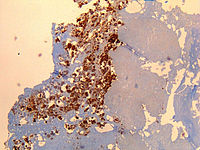
Photo from wikipedia
Q fever, a zoonotic disease caused by Coxiella burnetii, is endemic among cattle in Western France. However, studies assessing the risk of human infection in such areas are lacking to… Click to show full abstract
Q fever, a zoonotic disease caused by Coxiella burnetii, is endemic among cattle in Western France. However, studies assessing the risk of human infection in such areas are lacking to date, while they may provide information about key specific preventive actions which could be advised to the human populations living with or close to cattle. Therefore, we conducted a cross‐sectional study in two departments of Western France during the 2017/18 winter in order to explore possible risk factors for seropositivity among two distinct populations, i) an occupational risk group, that is, the cattle farmers, and ii) the general adult population (approached by blood donors). Sera were collected in 176 cattle farmers and 347 blood donors respectively, and tested for phase I and II antibodies using an indirect immunofluorescence antibody assay. Each participant was asked to fill in a questionnaire containing socio‐demographic characteristics, occupational and non‐occupational risk exposure. Identified risk factors were: in the general population, working in contact with ruminants, comparatively to any other activity (OR = 4.41; 95% CI: [1.59–6.55]); among farmers, managing an itself infected cattle herd (OR = 3.20; 95% CI: [1.59–6.55]). No other controllable risk factor (lifestyle, outdoor activities, proximity to pets and livestock animals, occupational practices) was here evidenced. In areas with endemically infected cattle, human exposure to Coxiella burnetii is to some extent unavoidable. This strengthens the need for physicians' awareness of the symptoms of Q fever and the appropriateness of general biosecurity measures, especially among at‐risk groups living there.
Journal Title: Zoonoses and Public Health
Year Published: 2021
Link to full text (if available)
Share on Social Media: Sign Up to like & get
recommendations!